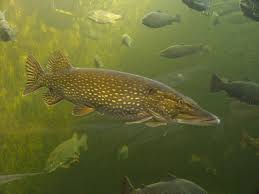
记忆方法
1. pick => toothpick => pike.
2. peak => pike.
3. turnpike => pike.
4. poke => pike.
2. peak => pike.
3. turnpike => pike.
4. poke => pike.
中文词源
pike 高速公路收费站,付费公路,收税关卡
缩写自turnpike,来自turn,转,pike,长矛,杆,引申词义公路收费站的放行杆。
pike 长矛,梭子鱼来自古法语pique,长矛,矛兵,来自piquer,刺,穿刺,来自俗拉丁语*piccare,刺,穿刺,词 源同pick,peak.可来自拉丁语picus,啄木鸟,来自PIE*spei,刺,尖刺,词源同spike,pinnacle. 引申词义梭子鱼。
英语词源
- pike
-
pike: English has two pikes now in common usage, which are probably ultimately the same word. Pike ‘spear’ [OE] goes back to an Old English pīc ‘pointed object’, which is closely related to English peak and pick ‘sharp implement’. It had various specific applications in Old and Middle English, now long defunct, including ‘pickaxe’, ‘spike’, ‘thorn’, ‘point of a shoe’, and ‘pitchfork’ (and pitchfork [13] itself was originally pickfork, a fork with ‘sharp points’; its current form, which emerged in the 16th century, is due to the association with ‘pitching’ or tossing hay on to a cart).
But the sense ‘weapon consisting of a long pole with a spike on top’ did not appear until the 16th century, partly inspired by the related Old French pique ‘pike’. Pike the fish [14] was probably also named with the descendant of Old English pīc, in allusion to its long pointed jaws (a similar inspiration can be seen in French brochet ‘pike’, a derivative of broche ‘spit’).
=> peak, pick, pitchfork - pike (n.1)
- "highway," 1812 shortening of turnpike.
- pike (n.2)
- "weapon with a long shaft and a pointed metal head," 1510s, from Middle French pique "a spear; pikeman," from piquer "to pick, puncture, pierce," from Old French pic "sharp point or spike," a general continental term (Spanish pica, Italian picca, Provençal piqua), perhaps ultimately from a Germanic [Barnhart] or Celtic source (see pike (n.4)). Alternative explanation traces the Old French word (via Vulgar Latin *piccare "to prick, pierce") to Latin picus "woodpecker." "Formerly the chief weapon of a large part of the infantry; in the 18th c. superseded by the bayonet" [OED]; hence old expressions such as pass through pikes "come through difficulties, run the gauntlet;" push of pikes "close-quarters combat." German Pike, Dutch piek, Danish pik, etc. are from French pique.
- pike (n.3)
- "voracious freshwater fish," early 14c., probably short for pike-fish, a special use of pike (n.2) in reference to the fish's long, pointed jaw, and in part from French brochet "pike" (fish), from broche "a roasting spit."
- pike (n.4)
- "pick used in digging," Middle English pik, pyk, collateral (long-vowel) form of pic (source of pick (n.1)), from Old English piic "pointed object, pickaxe," perhaps from a Celtic source (compare Gaelic pic "pickaxe," Irish pice "pike, pitchfork"). Extended early 13c. to "pointed tip" of anything. Pike, pick, and pitch formerly were used indifferently in English. Pike position in diving, gymnastics, etc., attested from 1928, perhaps on the notion of "tapering to a point."
权威例句
- 1. The Pike lives mainly in large rivers and lakes.
- 狗鱼主要生活在大江大湖中。
- 2. SPOCK, A CADET AT STARFLEET ACADY, BEGINS SERVING ABOARD THE ENTERPRISE UNDER CAPTAIN PIKE.
- 史巴克, 星舰学院的学员, 开始在PIKE舰长指挥的[企业号]中服役.
- 3. There have been threats to veto any legislation that comes down the pike.
- 他们威胁说要否决任何新出台的立法提案。
- 4. A pike weighing 29 lb 8 oz taken in 1878 was stuffed and is on display at the estate office.
- 一条1878年捕获的重29磅8盎司的梭子鱼被制成标本陈列在庄园管理处。
- 5. Pike was puffing away at a cigarette nervously.
- 派克紧张不安地一口接一口抽着烟卷.
